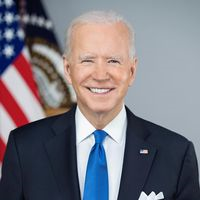Kamala Harris: The New Face of the Democratic Challenge** **
July 26, 2024, 7:22 am

Location: United States, Michigan, Lansing
Employees: 10001+
Founded date: 1837
Total raised: $50.4M

Location: United States, District of Columbia, Washington
Employees: 1001-5000
Total raised: $500K
** The political landscape has shifted dramatically. With President Joe Biden's unexpected exit from the 2024 presidential race, Vice President Kamala Harris has stepped into the spotlight. Her ascent marks a pivotal moment for the Democratic Party, as she prepares to face off against former President Donald Trump. This new chapter is not just about Harris; it’s about the future of American politics.
Harris is no stranger to the political arena. She has navigated the complexities of law and governance, first as California's attorney general and then as a U.S. senator. Now, she stands poised to become the first female president of the United States. This is a moment that could redefine the political narrative in America.
The endorsement from Nancy Pelosi, a heavyweight in the Democratic Party, adds weight to Harris's campaign. Pelosi's support signals a united front among Democrats, rallying behind Harris as she prepares to challenge Trump. The momentum is palpable. Harris's campaign reported a staggering $81 million raised in just 24 hours following Biden's withdrawal. This surge reflects a party eager for change and ready to embrace a new leader.
But the road ahead is fraught with challenges. Trump, facing legal troubles and a tarnished reputation, remains a formidable opponent. His campaign has already begun to attack Harris, labeling her as incompetent and overly liberal. The stakes are high. Harris must navigate these criticisms while presenting a vision that resonates with voters.
Harris's strategy appears to be twofold. First, she aims to capitalize on her prosecutorial background. She plans to frame the election as a contest between a seasoned prosecutor and a convicted felon. This narrative could resonate with voters who value law and order. Second, she intends to leverage her identity as a Black and Asian American woman. This dynamic adds a fresh perspective to the race, contrasting sharply with Trump's established image.
The generational divide is another crucial element. Harris, at 59, represents a younger, more diverse America. In contrast, Trump, at 78, embodies the old guard. This contrast could energize younger voters who are eager for change. Harris's campaign will likely focus on issues that matter to this demographic, such as climate change, healthcare, and social justice.
However, Harris's approval ratings have been lackluster. Polls indicate she is neck-and-neck with Trump in hypothetical matchups. This is a warning sign. Harris must work diligently to improve her public perception. She needs to connect with voters on a personal level, sharing her vision for the future while addressing their concerns.
The Democratic Party is rallying behind her, but not without reservations. Some prominent figures, including former President Barack Obama, have yet to endorse her. They advocate for a transparent process, suggesting that the party should consider all options before fully committing to Harris. This internal debate could complicate her path to the nomination.
Harris's campaign is already making strategic moves. She plans to visit battleground states, starting with Wisconsin, a crucial area for both parties. Her presence in these states will be vital as she seeks to build a coalition of support. Engaging with local communities and addressing their specific needs will be essential.
As the campaign heats up, the media's role will be critical. Harris must navigate the scrutiny that comes with being a female candidate. The press has historically treated women in politics differently, often focusing on personal attributes rather than policy. Harris needs to project strength and competence, countering any narratives that undermine her candidacy.
Trump's campaign is also adapting. His strategy will likely pivot from attacking Biden's age to targeting Harris's record. The former president has already begun to question her qualifications, framing her as a continuation of Biden's policies. This tactic could resonate with voters who are dissatisfied with the current administration.
The upcoming months will be a test of resilience for Harris. She must maintain her momentum while addressing the challenges posed by Trump and his supporters. The election is not just about winning; it's about shaping the future of the Democratic Party and the nation.
In conclusion, Kamala Harris's rise to the forefront of the Democratic race is a significant moment in American politics. Her candidacy represents a shift towards a more inclusive and diverse leadership. As she prepares to face Trump, the stakes are high. The outcome of this election could redefine the political landscape for years to come. Harris has the opportunity to inspire a new generation of voters and lead the country into a new era. The road ahead is uncertain, but the potential for change is immense. The battle for the White House is on, and Harris is ready to fight.
Harris is no stranger to the political arena. She has navigated the complexities of law and governance, first as California's attorney general and then as a U.S. senator. Now, she stands poised to become the first female president of the United States. This is a moment that could redefine the political narrative in America.
The endorsement from Nancy Pelosi, a heavyweight in the Democratic Party, adds weight to Harris's campaign. Pelosi's support signals a united front among Democrats, rallying behind Harris as she prepares to challenge Trump. The momentum is palpable. Harris's campaign reported a staggering $81 million raised in just 24 hours following Biden's withdrawal. This surge reflects a party eager for change and ready to embrace a new leader.
But the road ahead is fraught with challenges. Trump, facing legal troubles and a tarnished reputation, remains a formidable opponent. His campaign has already begun to attack Harris, labeling her as incompetent and overly liberal. The stakes are high. Harris must navigate these criticisms while presenting a vision that resonates with voters.
Harris's strategy appears to be twofold. First, she aims to capitalize on her prosecutorial background. She plans to frame the election as a contest between a seasoned prosecutor and a convicted felon. This narrative could resonate with voters who value law and order. Second, she intends to leverage her identity as a Black and Asian American woman. This dynamic adds a fresh perspective to the race, contrasting sharply with Trump's established image.
The generational divide is another crucial element. Harris, at 59, represents a younger, more diverse America. In contrast, Trump, at 78, embodies the old guard. This contrast could energize younger voters who are eager for change. Harris's campaign will likely focus on issues that matter to this demographic, such as climate change, healthcare, and social justice.
However, Harris's approval ratings have been lackluster. Polls indicate she is neck-and-neck with Trump in hypothetical matchups. This is a warning sign. Harris must work diligently to improve her public perception. She needs to connect with voters on a personal level, sharing her vision for the future while addressing their concerns.
The Democratic Party is rallying behind her, but not without reservations. Some prominent figures, including former President Barack Obama, have yet to endorse her. They advocate for a transparent process, suggesting that the party should consider all options before fully committing to Harris. This internal debate could complicate her path to the nomination.
Harris's campaign is already making strategic moves. She plans to visit battleground states, starting with Wisconsin, a crucial area for both parties. Her presence in these states will be vital as she seeks to build a coalition of support. Engaging with local communities and addressing their specific needs will be essential.
As the campaign heats up, the media's role will be critical. Harris must navigate the scrutiny that comes with being a female candidate. The press has historically treated women in politics differently, often focusing on personal attributes rather than policy. Harris needs to project strength and competence, countering any narratives that undermine her candidacy.
Trump's campaign is also adapting. His strategy will likely pivot from attacking Biden's age to targeting Harris's record. The former president has already begun to question her qualifications, framing her as a continuation of Biden's policies. This tactic could resonate with voters who are dissatisfied with the current administration.
The upcoming months will be a test of resilience for Harris. She must maintain her momentum while addressing the challenges posed by Trump and his supporters. The election is not just about winning; it's about shaping the future of the Democratic Party and the nation.
In conclusion, Kamala Harris's rise to the forefront of the Democratic race is a significant moment in American politics. Her candidacy represents a shift towards a more inclusive and diverse leadership. As she prepares to face Trump, the stakes are high. The outcome of this election could redefine the political landscape for years to come. Harris has the opportunity to inspire a new generation of voters and lead the country into a new era. The road ahead is uncertain, but the potential for change is immense. The battle for the White House is on, and Harris is ready to fight.
